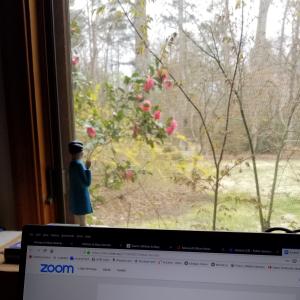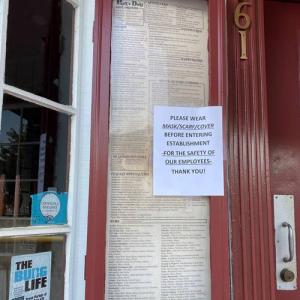A new W&M blog series. In this post, Meghan Bryant chronicles what it's like to work in the time of Corona.
Archive
Archive
- Acquiring a resource that would enable Professor Phaedra McNorton to continue teaching voice lessons to her students despite the inability to meet face-to-face was an interesting conundrum that was tackled in our latest Librarian Problem Solver post.
- A new W&M blog series. In this post, Alden Coffin chronicles what it's like to work in the time of Corona.
- Earlier this month, I joined members of the W&M Wizards and Muggles Club in Zoom for a Harry Potter book discussion. In November and February I had co-hosted similar Harry Potter discussions with Maggie Aschmeyer, the Hufflepuff Head of House, in Swem.
- A new W&M blog series. In this post, Katherine McKenzie chronicles what it's like to work in the time of Corona.
- A new W&M blog series. In this post, Jessica Ramey chronicles what it's like to work in the time of Corona.
- By Jada Copeland, External Relations Student Employee
- Throughout recent years, discussion of sustainability, environmental justice, and generally being kinder to Mother Earth have become mainstream topics. While being mindful of our consumption habits has been a big discussion point, many still feel lost when it comes to everyday environmentally positive swaps.
- A new W&M blog series. In this post, Amber Blanton chronicles what it's like to work in the time of Corona.
- Share your own personal stories of life during COVID-19 with W&M Libraries!
- A new W&M blog series. In this post, Sara Belmont chronicles what it's like to work in the time of Corona.
- A new W&M blog series. In this post, Kate McCallister chronicles what it's like to work in the time of Corona.
- A recent addition to the Thomas L. Williams Collection reveals one cautionary tale about exotic pet ownership here in Williamsburg, Virginia.
- The COVID-19 coronavirus pandemic stormed into Williamsburg the middle weeks of March. When W&M students left campus for spring break on Friday, March 6, normal prevailed. A week later, profound changes were underway.
- A new W&M blog series. In this post, Shayna Gutcho chronicles what it's like to work in the time of Corona.
- Our library staff members are chronicling their experiences living through a pandemic. In this post Research Librarian, Liz Bellamy, writes about how the Research and Instruction team is working alone, together.
- A new W&M blog series. In this post, Gina Woodward chronicles what it's like to work in the time of Corona.
- One of the experiences Mosaic Fellows acquire during their studies is teaching and library instruction. However, the COVID-19 pandemic has altered the way teaching and instruction is now being taught to students at William & Mary. Yitazba chronicles her journey leading her first online library instruction session.
- Introducing a recently digitized scrapbook documenting the experiences of an African American sailor during the attack on Pearl Harbor
- A new W&M blog series. In this post, Libby McDaniel chronicles what it's like to work in the time of Corona.





















